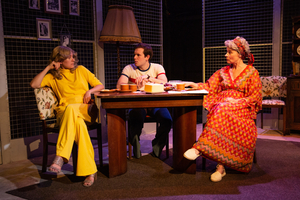Review: MY ONE TRUE SELF, Tristan Bates Theatre

![]()
Lady L's 60th birthday is approaching and her children Gordon and Oonagh (Theo Bamber and Lucy Lowe) join her for the celebration. It becomes immediate that they're not there out love, but to claim what is theirs. Meanwhile, Kapenie, the help, makes it clear to his grandson George: his loyalty stands with his employer, even at the expense of his own family. Alexander Matthews's My One True Friend is an underwhelming and overly pretentious account of racism and privilege in 1978 Rhodesia.
Inspired by the playwright's time in the unrecognised state during the mid-70s and 80s and directed here by Antony Law, the piece falls short in its goals. The exceptionally eloquent characters - who speak in lyrical prose using stately terminology and metaphors throughout - are too homogeneous and textually alike, resulting in their sounding rather the same. It's hard to understand the point Matthew wants to make, as there's little-to-no truthful character development in it.
Between the bratty and entitled exchanges between the siblings and their mother's exertion of authority, Kapenie (played very subtly by Mensah Bediako) stands there taking cruel and undeserved verbal abuse from Lady L (delivered imperiously by the unwavering Suzanna Hamilton) while George tries to titillate him with the potential of a new life in the United States. What should be a play based on intense dialogue that leads to the deep catharsis achieved when nobody shows up to the matriarch's birthday party is actually a shallow commentary with bad wigs and subpar voice-overs.
Matthews certainly portrays a society that's struggling with the incoming of a modern world and a traditionally racist way of living. Gunshots and insults coming from the outside keep Kapeanie in his place, safe in Lady L's house and shrouded by the deference given by their Stockholm Syndrome-sounding relationship. There's no real insight into this. One could say that after 25 years, a life out of service might terrify the man and his position of servitude is, at this point, too secure and familiar.
In short, there seem to be too many frills and not enough substance to establish solid and urgent observations. The direction also doesn't truly help the stillness of the script. Law clearly focuses the attention on the (refined beyond question) text, but doesn't manage to extrapolate its dramatic build-up, turning the characters into figurines. Adrian Gee's set design is, however, evocative and allegorical in its foundation. He surrounds the period sitting room with wire netting, simulating the different societal cages that constrict the individuals.
The siblings are suffocated by their mother's backwardness; Lady L finds herself confined by class and lack of intellectual flexibility; and Kapenie is obviously caged by his own role. Interestingly, Matthews attempts to defend the man's decision to stay back instead of escaping his metaphorical shackles and joining his grandson with a simple conversation between the two where the grandfather hails his mental freedom and the other calls out his delusions.
In the introduction to the play found in the program, the writer says that theatre has no other device but language (which in itself is a debatable statement). He then calls on the use of "heightened dialogue" to "ramp up the intensity with good direction and good acting". What's gone wrong here, then?
My One True Friend runs at Tristan Bates Theatre until 14 September.
Photo credit: Mark Senior
Reader Reviews
Videos

